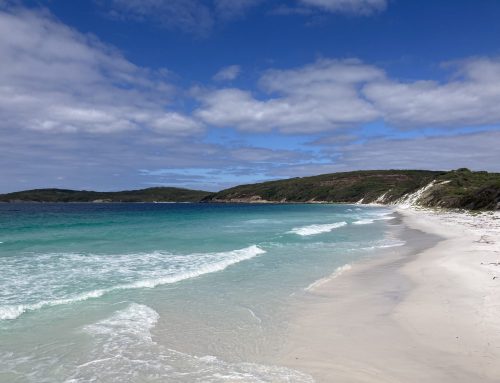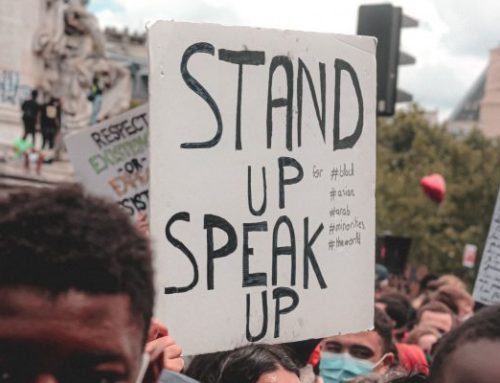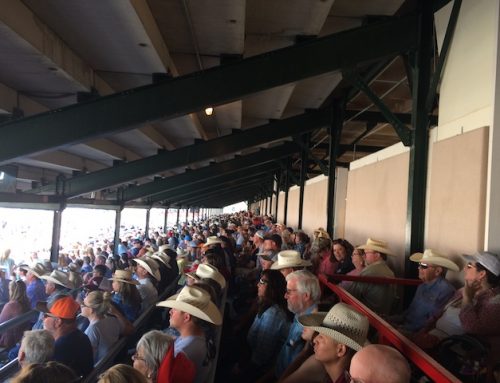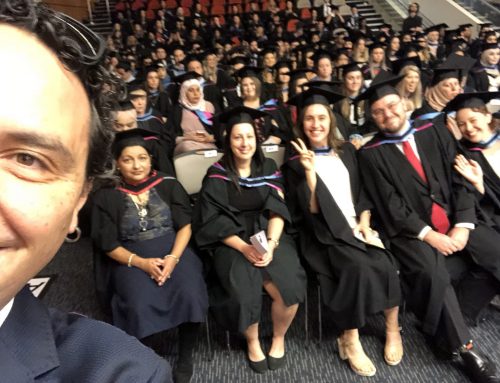The first thing you notice when arriving in Wyoming is that the sky is different. Somehow it seems bigger, deeper and the clouds seem, ‘fluffier’.
The second is that the endless landscape that reaches out to the horizon on either side of the highway give me the same sense of wonder when I stare at the ocean. As someone who has spent most of their life within walking distance to the beach, it is hard to imagine that the ocean can be replaced by the plains of Wyoming.
My life in Coogee and here is Laramie (Wyoming) feel both familiar and worlds apart.
Within a few days of arriving here, I attended the Frontier Days Rodeo in Wyoming’s capital, Cheyenne. It is the world’s largest outdoor rodeo and the organisers describe it as the ‘daddy of them all.’
As an outside observer, with absolutely no interest in ‘a rodeo’, I attended with an open mind and a decision to embrace the experience. Before I knew it, I was caught in the excitement of the various events: the tenacity of the riders on the bucking horses, the sense of madness underpinning the bull riding and the ‘clowns’ that protect the riders, and most impressive of all, the speed, elegance and power of the ‘cowgirl’ barrel racing.
Over the last two weeks, I have started on a journey of understanding the political divides that define contemporary politics. My last blog focussed on ‘political correctness’.
In this blog, I want to share some initial observations of my time here.
- Trap of homogenisation
In 2016, Associate Professor John Rees wrote an excellent opinion piece outlining the risk of homogenising religious voters. In the article, Rees observes the complexity of those that place their religious observations at the core of their identity – noting the intersectional nature of their identity.
As such, Rees observes that:
“Perhaps a bigger surprise, however, is not that Christian voting patterns can swing, split and scatter, but that a powerful assumption still persists that religious democratic behaviour should be unthinkingly predictable.”
In this way, it is easy to fall into a homogenisation trap when viewing voters that we do not agree with (observe the #Quexit meme that started after the last Australian federal election).
As a progressive, I bristle when I hear commentators like Bolt or Divine talk of ‘the left’ like we are all representatives of the former Soviet Union and driven by ideology alone. We are more complex than that, but must also extend that courtesy to those we do not agree with.
- The role of religion is real…
I am not a religious person and my liberal arts education means that I do not think the place for religion is in a secular state. Despite this, it is important to recognise that Judeo-Christian values define the moral compass for many, and it is as important for many Australians as it is in the Unites States. This is something I have come to respect and accept.
We saw this in the strong negative response to the same sex marriage postal vote and in support for Israel Folau.
This is not to contradict my first point on homogenisation because there is diversity within these communities – but it is to emphasise that religious identity is real and should not be dismissed.
On a side note, my initial observation is that this is not necessarily exclusionary: at the beginning of the rodeo, there was a prayer but ‘Jesus’ was not mentioned. Rather, a more generic prayer to ‘God’ – meaning you could put forward your own Deity.
- Community counts
I attended the Frontier Days parade that winds through the streets of Cheyenne. What I noticed was that there was a real pride in the communities here: they may be religious, patriotic, locally focussed and nationalistic but it felt authentic. Sure, sometimes the parade was kitsch and at other times it felt a bit over the top, but there was a lack of cynicism and a sense of inclusion.
Having lived in many places with communities that identified as progressive and talked of the ‘power of their community’, the community identity here is no less real and needs to be understood and respected.
- There is an acceptance of difference – but it does not need to be discussed or agreed to
The picture often portrayed of conservative areas, be it Queensland or Red States in the United States, is one of intolerance. Sure, intolerance exists here like it does everywhere (and as mentioned in my last blog, amongst the most progressive of us).
One of the great divides I am seeing materialise has emerged when – and indulge me the right to put forward a binary and generalised position – progressives want diversity accepted and acknowledged. What I am seeing amongst more conservative communities is that diversity is simply accepted, there is no need to acknowledge of discuss it.
This is not something that sits comfortably with me. In saying that, there is a certain comfort in the attitude: ‘I don’t care who you are, or what you believe it, if you are a good person, let’s just get along’…
- Donald Trump…
In the conversations I have had with Trump supporters, I have found a sense of indifference towards Donald Trump himself or his history. What makes Trump popular amongst a certain section of his supporters is that he is seen as an outsider who is telling the political establishment (and by extension ‘the elites’) to ‘Go to hell’ (Note: Americans are so much more polite than Australians – we would use stronger expletives!).
Over the last three decades, we have witnessed a hollowing out of the middle class in both the USA and Australia – in fact, it is something that defines the experience of most OECD nations.
There should be little wonder that when someone comes along, and trash talks the institutions and the political parties (be they centre-left or centre-right) that laid the path that got us here, that person is popular.
Like Pauline Hanson’s One Nation, racism, bigotry and a sense of white nationalism all play a part, but by lumping all those that vote for Trump or Hanson as ‘deplorables’, we are committing the sin of homogenisation and misunderstanding that further alienates those on the other side of the political spectrum. Those who we should be reaching out to.
—
As I wrote this piece, news of two mass shootings came through: in Texas and Ohio, killing at least 31 people. Many commentators have identified the need for authorities to confront the challenges posed by white-nationalist ideologies. This is something that is increasingly evident in many western nations – including Australia.
I will say that this is the one thing that scares me living in the USA – but lumping all those that we disagree with into the same category commits the same offence as those commentators we despise when they talk of Islam.
We all should challenge that thinking…






Leave A Comment